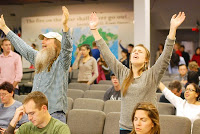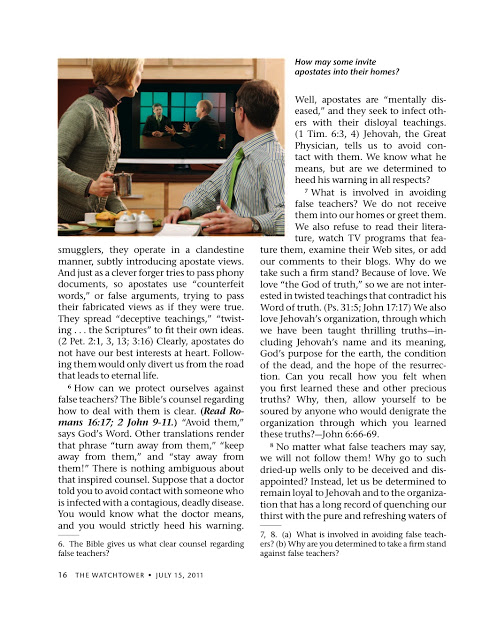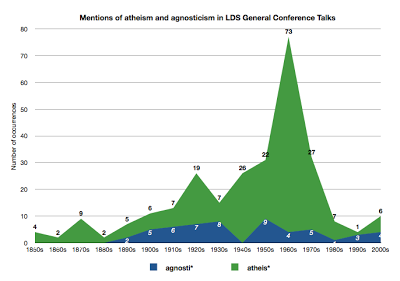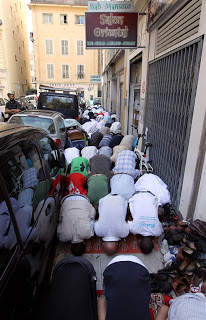No question, Jehovah’s Witnesses play hardball with their ex-members. Ostracism of unbelievers (even if they’re family members) is not just a common practice; it’s official.
As if that weren’t enough, now there’s more. The July 2011 issue of the Watchtower (PDF) describes apostates as “mentally diseased”.
Suppose that a doctor told you to avoid contact with someone who is infected with a contagious, deadly disease. You would know what the doctor means, and you would strictly heed his warning. Well, apostates are “mentally diseased,” and they seek to infect others with their disloyal teachings. (1 Tim. 6:3, 4) Jehovah, the Great Physician, tells us to avoid contact with them. We know what he means, but are we determined to heed his warning in all respects?
Not everyone is happy with this assessment.
“Many like me remain associated with the Witnesses out of fear of being uncovered as an ‘apostate’ and ousted, not just from the organisation, but from their own friends and families,” said the man, who would only give the name John. “I find I am now branded as ‘mentally diseased’ – giving any who discover my true beliefs free licence to treat me with disdain.”
Yep, that shit’s hardcore. But what’s that little Bible verse tucked away in there? Could it be that the Witnesses are simply quoting the Bible, and that’s what describes people as “mentally diseased”?
Off to check 1 Timothy 6:3–4 (KJV).
6:3 If any man teach otherwise, and consent not to wholesome words, even the words of our Lord Jesus Christ, and to the doctrine which is according to godliness;
6:4 He is proud, knowing nothing, but doting about questions and strifes of words, whereof cometh envy, strife, railings, evil surmisings,
The key word here is “doting”, which now means “to be fond of”, but which in King James’ time meant “to be feeble-minded from age“, which is why we speak of an elderly person being “in their dotage”.
But of course, the Witnesses use their own New World Translation. What does it say?
3 If any man teaches other doctrine and does not assent to healthful words, those of our Lord Jesus Christ, nor to the teaching that accords with godly devotion, 4 he is puffed up [with pride], not understanding anything, but being mentally diseased over questionings and debates about words. From these things spring envy, strife, abusive speeches, wicked suspicions,
There it is. It still seems a bit harsh, but at least it’s not just the Witnesses being shitty to people — it’s the Bible being shitty to people. So now the question becomes: Is the JW translation of that verse a good one, or not? We’re going to have to take it to the Greek.
I don’t speak Greek, but fortunately people have made some good resources for Bible nerds. Here’s the relevant verse (PDF).
The key word is ‘νοσέω’ (here ‘νοσων’, or ‘noson’ in Roman letters). It only occurs once in the New Testament. So what’s it mean? Off to Strong’s.
1) to be sick
2) metaph. of any ailment of the mind
a) to be taken with such an interest in a thing as amounts to a disease, to have a morbid fondness for
Well, that’s kind of ambiguous. And herein lies the problem. If you wanted to go for the “mentally diseased” view, you’d certainly have a case. If, however, you wanted to soft-pedal it, you could try a more metaphorical translation like “unhealthily obsessed with questionings” or “morbidly interested in questionings”. Both readings are possible, depending on how much you like apostates, which if you’re Paul, isn’t much.
Still: Wasn’t Paul a shit? Imagine describing an ex-member of your church as someone with a mental illness. That’s just piling on. And even the “nice” version isn’t that nice. How accurate is that, describing someone who’s left the church as unhealthily obsessed with the church, or having a morbid interest in it, not able to stop talking about it, writing… erm.
Well.











Recent Comments